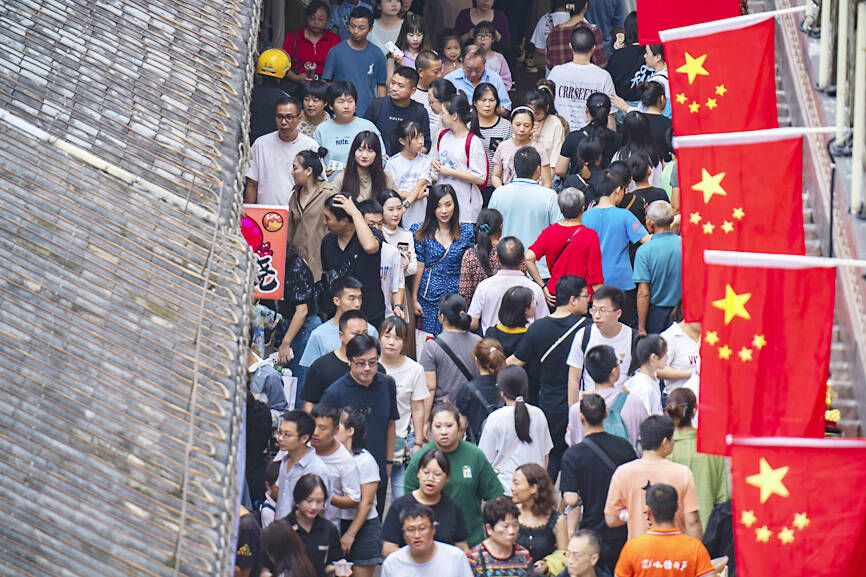The Ciaotou Prosecutors’ Office in Kaohsiung yesterday released two suspects on bail who have been accused of recruiting Taiwanese to join tours to China funded by Beijing and in which they were urged to vote for pan-blue candidates in January’s presidential and legislative elections.
The pan-blue camp generally refers to the Chinese Nationalist Party (KMT), the People First Party, the New Party and the Young China Party, which support closer relations with China.
Prosecutors said that a man, surnamed Cheng (鄭), and a woman, surnamed Yeh (葉), who are members of the China Pan-Blue Association, recruited Taiwanese tourists to join tours arranged and funded entirely by China’s Taiwan Affairs Office (TAO) from May to last month.

Photo: AP
An investigation found that the two had helped arrange five tours to China, with TAO representatives accompanying the visitors throughout the trip. The five destinations were: Shandong Province from May 7 to 14; Shanxi Province from June 24 to July 2; Inner Mongolia from Aug. 3 to 13; Xinjiang Province from Sept. 4 to 18; and Henan Province from Oct. 19 to 28, prosecutors said.
About 130 Taiwanese participated in the tours, including six current and former borough wardens, prosecutors said.
During the trips, visitors met with representatives from the TAO and China’s United Front Work Department, who urged them to vote for pan-blue candidates to remove the Democratic Progressive Party government from office, they said.
“TAO representatives used these meetings to ask the visitors about their political inclinations and express the wish that they would support cooperation between the pan-blue camp and the Taiwan People’s Party or a specific presidential candidate. Cheng also helped amplify their agenda on the sidelines,” prosecutors said.
The visitors were also told to support cross-strait peace and the so-called “1992 consensus,” and to oppose Taiwanese independence.
The “1992 consensus” — a term that former Mainland Affairs Council chairman Su Chi (蘇起) in 2006 admitted making up in 2000 — refers to a tacit understanding between the KMT and the Chinese Communist Party (CCP) that both sides of the Taiwan Strait acknowledge there is “one China,” with each side having its own interpretation of what “China” means.
The prosecutors’ office formed a six-member team and summoned Cheng, Yeh and 20 others for investigation.
Prosecutors said that Cheng and Yeh are suspected of contravening the Anti-Infiltration Act (反滲透法), the Presidential and Vice Presidential Election and Recall Act (總統副總統選舉罷免法) and the Public Officials Election and Recall Act (公職人員選舉罷免法).
The two were released on bail of NT$150,000 and NT$50,000 respectively, and were restricted from leaving the country.
Aside from treating Taiwanese tourists to free tours to China, Taiwanese security officials have identified other ways that Beijing uses to interfere in Taiwan’s elections, such as deploying artificial intelligence to disseminate misinformation and inviting political commentators and heads of polling firms to attend forums in China.

A magnitude 5.6 earthquake struck off the coast of Yilan County at 12:37pm today, with clear shaking felt across much of northern Taiwan. There were no immediate reports of damage. The epicenter of the quake was 16.9km east-southeast of Yilan County Hall offshore at a depth of 66.8km, Central Weather Administration (CWA) data showed. The maximum intensity registered at a 4 in Yilan County’s Nanao Township (南澳) on Taiwan’s seven-tier scale. Other parts of Yilan, as well as certain areas of Hualien County, Taipei, New Taipei City, Taoyuan, Hsinchu County, Taichung and Miaoli County, recorded intensities of 3. Residents of Yilan County and Taipei received

Taiwan has secured another breakthrough in fruit exports, with jujubes, dragon fruit and lychees approved for shipment to the EU, the Ministry of Agriculture said yesterday. The Animal and Plant Health Inspection Agency on Thursday received formal notification of the approval from the EU, the ministry said, adding that the decision was expected to expand Taiwanese fruit producers’ access to high-end European markets. Taiwan exported 126 tonnes of lychees last year, valued at US$1.48 million, with Japan accounting for 102 tonnes. Other export destinations included New Zealand, Hong Kong, the US and Australia, ministry data showed. Jujube exports totaled 103 tonnes, valued at

TRUST: The KMT said it respected the US’ timing and considerations, and hoped it would continue to honor its commitments to helping Taiwan bolster its defenses and deterrence US President Donald Trump is delaying a multibillion-dollar arms sale to Taiwan to ensure his visit to Beijing is successful, a New York Times report said. The weapons sales package has stalled in the US Department of State, the report said, citing US officials it did not identify. The White House has told agencies not to push forward ahead of Trump’s meeting with Chinese President Xi Jinping (習近平), it said. The two last month held a phone call to discuss trade and geopolitical flashpoints ahead of the summit. Xi raised the Taiwan issue and urged the US to handle arms sales to

BIG SPENDERS: Foreign investors bought the most Taiwan equities since 2005, signaling confidence that an AI boom would continue to benefit chipmakers Taiwan Semiconductor Manufacturing Co’s (TSMC, 台積電) market capitalization swelled to US$2 trillion for the first time following a 4.25 percent rally in its American depositary receipts (ADR) overnight, putting the world’s biggest contract chipmaker sixth on the list of the world’s biggest companies by market capitalization, just behind Amazon.com Inc. The site CompaniesMarketcap.com ranked TSMC ahead of Saudi Aramco and Meta Platforms Inc. The Taiwanese company’s ADRs on Tuesday surged to US$385.75 on the New York Stock Exchange, as strong demand for artificial intelligence (AI) applications led to chip supply constraints and boost revenue growth to record-breaking levels. Each TSMC ADR represents